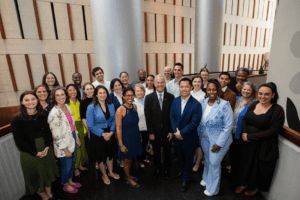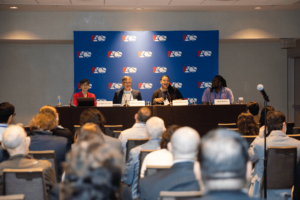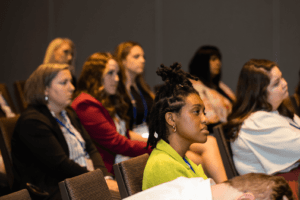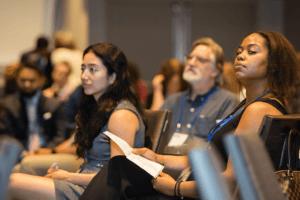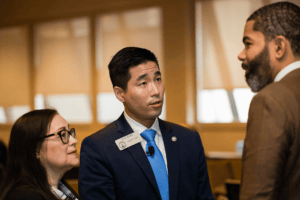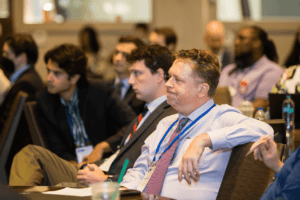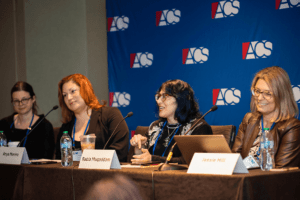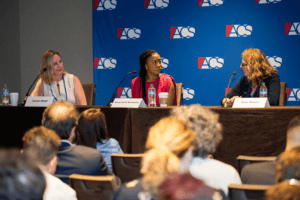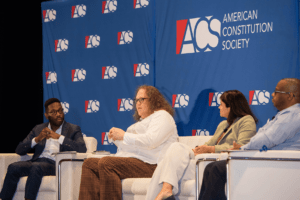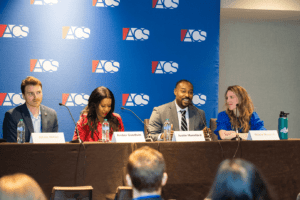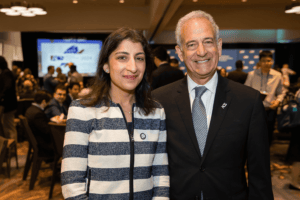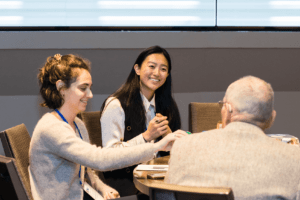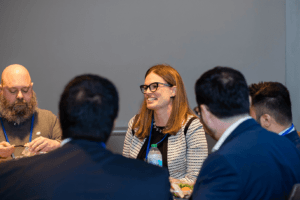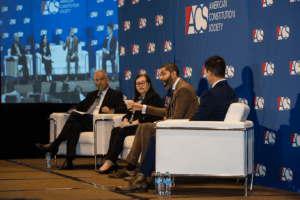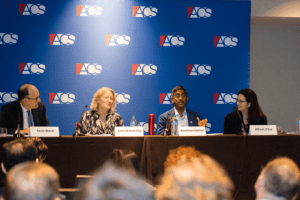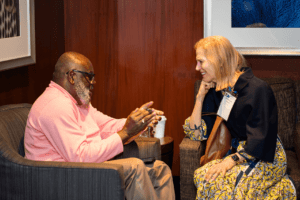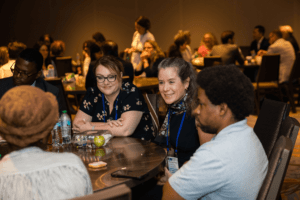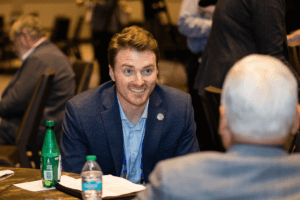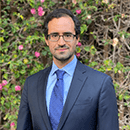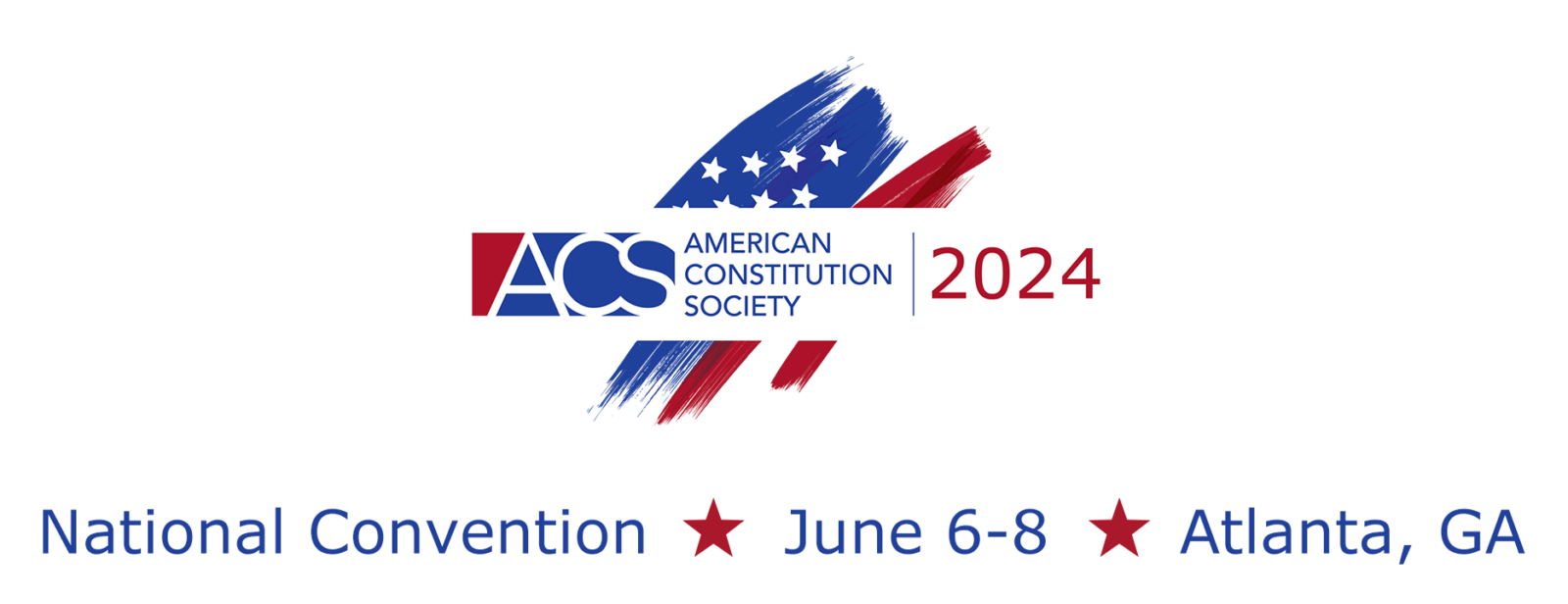
The ACS National Convention is the premier annual progressive legal gathering, bringing together lawyers, law students, scholars, judges, activists, and policymakers to examine some of the most urgent and challenging issues confronting our nation.
National Convention
Thursday, June 6 - Saturday, June 8
Westin Peachtree Plaza
210 Peachtree St. NW
Atlanta, GA
Registration is now closed.
Photos
Photos by Jenni Girtman
Videos
FEATURED SPEAKERS
 Lina Khan Lina KhanChair U.S. Federal Trade Commission |
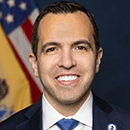 Matthew J. Platkin Matthew J. PlatkinNew Jersey Attorney General |
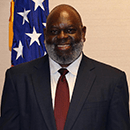 Hon. Carlton Reeves Hon. Carlton ReevesJudge, U.S. District Court for the Southern District of Mississippi Chair, United States Sentencing Commission |
AWARDS
Progressive Champion Award
 Black Voters Matter Black Voters MatterCliff Albright and LaTosha Brown Co-Founders |
Ruth Bader Ginsburg Scholar Award
 Miriam Seifter Miriam SeifterProfessor of Law Co-Director of the State Democracy Research Initiative Rowe Faculty Fellow in Regulatory Law University of Wisconsin Law School |
Constance Baker Motley National Student Writing Competition
 Eva Quinones Eva QuinonesNew York University School of Law Class of 2024 |
The Richard D. Cudahy Writing Competition on Regulatory and Administrative Law
Lawyer Category
|
Student Category
|
Thursday, June 6, 2024
3:30 to 5:00 p.m.
Diversity, Equity, and Inclusion Workshop
This interactive workshop will examine how the legal profession can advance diversity, equity, and inclusion (DEI) following the Supreme Court’s decision in Students for Fair Admissions. We will explore the impact that each of us can make in whatever roles we find ourselves in, as practitioners, advocates, law students, and legal scholars.
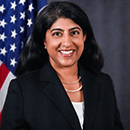
Hon. Kalpana Kotagal |
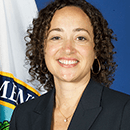
Hon. Catherine E. Lhamon |
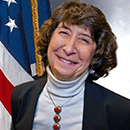
Hon. Jocelyn Samuels |
Friday, June 7, 2024
Opening Plenary – 9:15 to 10:45 a.m.
Engaging Progressives in the South
The latter half of the twentieth century saw a regional political realignment that resulted in the emergence of the now well-trod red state/blue state narrative and the conventional wisdom that southern, exurban, and rural America are monolithically conservative. But this narrative is being successfully challenged by the election of officeholders in historically conservative states and localities, including in the South, who are pursuing progressive laws and policies with the support of their constituents. What challenges do progressive public officeholders at the local, state, and federal level face, and what opportunities can they leverage to protect reproductive, LGBTQ+, labor, and voting rights and pursue racial justice and criminal legal reform?
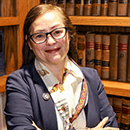
Hon. Deborah Gonzalez |
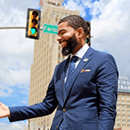
Hon. Chokwe Antar Lumumba |
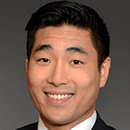
Hon. Sam Park |

Russ Feingold (Moderator) |
Breakout 1 – 11:00 a.m. to 12:00 p.m.
The Body Politics
Conservative controlled states have expended extraordinary time and attention restricting bodily autonomy for residents from historically vulnerable and marginalized groups. States are criminalizing those seeking and providing gender-affirming and reproductive healthcare, restricting the availability of resources in-state, and, in some cases, attempting to restrict travel for residents seeking to access resources in other states. Organizers and litigators are working tirelessly to preserve or restore access to healthcare in statehouses and federal and state courthouses throughout the country. What can the successes and setbacks these advocates have encountered teach us about effective strategies to engage in intersectional work to protect the availability of necessary, oftentimes lifesaving healthcare?

Jessie Hill |

Anya Marino |

Rabia Muqaddam |
Truth, Racial Healing, and Transformation: Lessons and Momentum from the Reparations Movement
In the past few years, the movement for reparations for Black Americans has seen unprecedented energy and momentum. Reparations is now a recurring topic of debate on the national stage, and localities and states have begun earnest efforts to assess and atone for past harm. At the same time, increasingly mobilized opposition forces are eager to magnify challenges and obstacles to derail the movement. Every government to consider reparations does so amid great public pressure and scrutiny. This panel unites activists and policymakers from states and localities across the U.S. who have worked in the Truth, Racial Healing, and Transformation movement to share learnings and paths forward.

Lisa Holder |
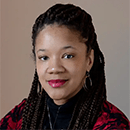
Robin Rue Simmons |

Karcheik Sims-Alvarado |
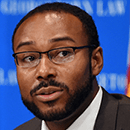
Justin Hansford (Moderator) |
The Necessary Labor for Democracy’s Survival
Organized labor’s role in improving workers’ wages, benefits, and working conditions is well known. But the labor movement’s importance extends beyond the workplace, playing a pivotal role in the very health of our democracy. Labor unions foster community, provide workers opportunities to practice their civic skills, and increase workers’ resistance to authoritarian appeals. Consequently, attacks on labor not only threaten fairness within the workplace, but fairness within the institutions of our government. How has the anti-labor movement affected American democracy? How might progressive lawyers use this period of renewed focus on labor and the value of unions to reinvigorate workers’ rights and, ultimately, to safeguard our democracy?

Keith M. Bullard II |

Angela B. Cornell (Moderator) |

Matthew Ginsburg |
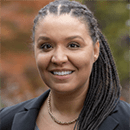
Courtlyn Roser-Jones |
Afternoon Workshop – 1:30 to 2:30 p.m.
Beyond Litigation: Alternative Legal Careers Workshop
This workshop will explore how law students and young attorneys can build careers and advocate outside the traditional model of litigation. Through a survey discussion of scholarship, media engagement, community organizing, and public service, panelists will examine how attorneys can proactively strategize and achieve results outside of the courtroom.

Amber Goodwin |

Justin Hansford |
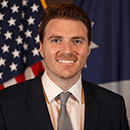
Adam Miller |
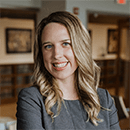
Grace Stranch |

Joey Vettiankal (moderator) |
Breakout 2 – 3:00 to 4:00 p.m.
Race, Gender, and the Right to Bear Arms
Debates over the Second Amendment and “gun rights” often center the perspectives and experiences of white male gun owners. Although men of color are half as likely to own guns as white men, they are 2 to 12 times more likely to die of gun violence and overwhelmingly bear the brunt of laws criminalizing gun possession. Meanwhile, American women face higher rates of lethal gun violence than women in any other high-income country, with Black women six times as likely to be killed as white women.
Now, less than two years after its landmark Second Amendment decision in Bruen began requiring courts to consider only “history and tradition” when evaluating gun regulations, the Supreme Court weighs overturning a federal law that disarms people subject to domestic violence restraining orders. How should the Court grapple with the racism and misogyny that infects so much of this nation’s histories and traditions? And how can elevating the perspectives, experiences, and wisdom of women and people of color chart a more responsive, intersectional path forward on gun violence prevention?

Amber Goodwin |
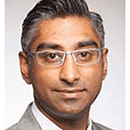 Pratheep Gulasekaram (Moderator) Professor University of Colorado |

Esther Sanchez-Gomez |
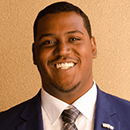
Christopher Smith |
The All-Out Assault on Agency Authority
For decades, antiregulatory forces, led by the conservative legal movement and profit-motivated business interests, have been waging an attack on the administrative state. Their efforts have recently been gaining traction. Two years ago, in West Virginia v. EPA, the Supreme Court announced the new major questions doctrine, which critics argue is a powerful de-regulatory tool. This term, the Court is considering a series of cases that attack agency authority on a variety of fronts, including efforts to overturn the forty-year-old Chevron doctrine, declare the Securities and Exchange Commission’s administrative enforcement scheme unconstitutional, strike down the Consumer Financial Protection Bureau’s funding mechanism, and allow newly formed entities to bring facial challenges to decades-old regulations. How should we understand this antagonism toward agency authority, and how can we protect effective governance?
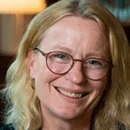
Lisa Heinzerling |

Sambhav Sankar |
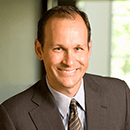
Kevin M. Stack (Moderator) |

Allison M. Zieve |
A First Amendment Right to Troll?
This Supreme Court term could redefine the legal boundaries of online speech among and between Americans and their elected representatives. In a case that could limit constituents’ ability to weigh in on issues important to them—from the most parochial school board decisions to major federal policy—the Court has been asked to determine whether a public official violates the First Amendment by blocking an individual on the official’s personal social media account. The Court will also resolve a circuit split regarding controversial anti-content moderation laws passed in Florida and Texas, filling the vacuum created by prolonged congressional inaction on platform regulation and content moderation. What are the legal and policy implications of the public square and marketplace of ideas migrating to the internet and social media platforms? How can we protect political speech online while building a truly multiracial democracy?

Nora Benavidez |

Sarah Hunt-Blackwell |

Kate Ruane |
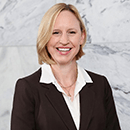
Sonja West (Moderator) |
Closing Plenary – 4:30 to 6:00 p.m.
Democracy, No Matter the Zip Code
Despite a few recent wins that preserve what is left of the Voting Rights Act, the Supreme Court and many federal appellate courts remain hostile to one of the landmark legislative achievements of the Civil Rights Era. Conservative dominated courts routinely shut the courthouse doors to voters seeking to vindicate their rights. Conservative state legislatures, often gerrymandered into entrenched power, continue a campaign of open hostility toward voters in marginalized communities. How can progressives work in conservative areas to expand access to the ballot box? Should advocates focus on state constitutional protections? What about states in which such protections don’t exist? In the run-up to the 2024 election, what can be done at the local and state level to combat the growing threat of election denialism?

Hon. Saira Draper |
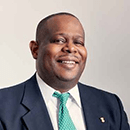
Bradley Heard |
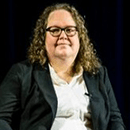
Carrie McNamara |

Miriam Seifter |
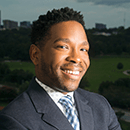
Fred Smith (Moderator) |
Schedule
Subject to change
Thursday, June 6
10:00 a.m. – 1:00 p.m.
Optional Meet-Up Activities
Meet in Hotel Lobby
10:00 a.m. – 6:00 p.m.
Quiet Room Chastain I (Sixth Floor)
12:00 p.m.
Registration Opens Chastain Foyer (Sixth Floor)
2:00 – 3:15 p.m.
Chapter Leaders Meeting
All Chapter Leaders Welcome
Chastain F (Sixth Floor)
3:30 – 5:00 p.m.
Diversity, Equity, and Inclusion Workshop
Chastain D (Sixth Floor)
5:00 – 6:00 p.m.
Welcome Reception
The Overlook (Sixth Floor)
6:30 – 8:30 p.m.
Welcome Dinner
Savannah Ballroom (Tenth Floor)
9:00 – 10:00 p.m.
Faculty Advisors and Judges Mixer (Invitation Only)
Café (Fifth Floor)
9:00 – 10:30 p.m.
Law Student Walking Tour & Meet Up Activity
Coordinated by the Emory and Georgia State Law School Student Chapters
Meet in Hotel Lobby
Friday, June 7
7:30 – 9:00 a.m.
Path to the Bench Meeting (Invitation Only)
Chastain D (Sixth Floor)
9:15 – 10:45 a.m.
Opening Plenary
“Engaging Progressives in the South”
Savannah Ballroom (Tenth Floor)
Federal Trade Commission Chair Lina Khan speaks at 10:30 a.m.
10:00 a.m. – 6:00 p.m.
Quiet Room Chastain I (Sixth Floor)
11:00 a.m. – 12:00 p.m.
Morning Breakout Session
“The Body Politics” – Chastain H (Sixth Floor)
“Truth, Racial Healing, and Transformation: Lessons and Momentum from the Reparations Movement” – Chastain G (Sixth Floor)
“The Necessary Labor for Democracy’s Survival” – Chastain D (Sixth Floor)
12:15 p.m.
Boxed lunch pick-up Chastain Foyer (Sixth Floor)
12:15 – 2:00 p.m.
Practice Group Lunches (Advanced Registration Required)
Voting & Elections – Ansley 1 (Fourteenth Floor)
Non-profit – Ansley 2 (Fourteenth Floor)
Labor & Employment – Ansley 3 (Fourteenth Floor)
General Litigation – Ansley 4 (Fourteenth Floor)
Criminal – Ansley 5 (Fourteenth Floor)
Civil Justice/Plaintiffs – Ansley 6 (Fourteenth Floor)
Appellate – Ansley 7 (Fourteenth Floor)
Academia – Ansley 8 (Fourteenth Floor)
Civil Rights – Chastain F (Sixth Floor)
1:30 – 2:30 p.m.
Beyond Litigation: Alternative Legal Careers Workshop
Chastain D (Sixth Floor)
3:00 – 4:00 p.m.
Afternoon Breakout Session
“Race, Gender, and the Right to Bear Arms” – Chastain G (Sixth Floor)
“The All-Out Assault on Agency Authority” – Chastain D (Sixth Floor)
“A First Amendment Right to Troll?” – Chastain H (Sixth Floor)
4:30 – 6:00 p.m.
Closing Plenary
“Democracy, No Matter the Zip Code”
Savannah Ballroom (Tenth Floor)
New Jersey Attorney General Matthew Platkin speaks at 4:30 p.m.
6:00 – 7:00 p.m.
Members of Color Networking Mixer
This mixer, hosted by ACS Board Chair Roscoe Jones, will honor and celebrate our members of color and provide space for them to network, connect, and learn more about ACS’s ongoing diversity and inclusion efforts.
Café (Fifth Floor)
6:30 – 7:30 p.m.
Closing Reception
The Overlook (Sixth Floor)
8:00 – 10:00 p.m.
Student Networking Dinners (Invitation Only)
(Off Site)
8:00 – 10:00 p.m.
Georgia Lawyer Chapter Hosted Happy Hour
Café (Fifth Floor)
Saturday, June 8
7:30 – 9:30 a.m.
Second Annual Birding Constitutional Bird Walk
Meet in the Hotel Lobby
10:00 a.m. – 12:00 p.m.
Next Generation Leader Brunch (Invitation Only)
Chastain Room (Sixth Floor)
12:30 – 4:00 p.m.
Student Retreat
All Students Welcome
Savannah Ballroom (Tenth Floor)
Continuing Legal Education (CLE)
Click here to view this year’s CLE materials »
For those requesting CLE for participation, you will be required to log code words announced during Convention sessions in order to verify participation and obtain credit using this form.
ACS is in the process of applying to states for CLE credit. The availability and amount of CLE credit may vary by state. So far, ACS has been approved for the following:
Approved:
California (via presumptive approval) – 5 credits
Colorado – 5 credits
Delaware – 5 credits
Florida – 6 credits
Georgia – 5 credits
Illinois – 5.75 credits
Indiana – 5 credits
Minnesota – 5 credits
Missouri – 6 credits
North Carolina
Oklahoma – 6 credits
Oregon – 5 credits
New York (via reciprocity) – 5 credits
Pennsylvania – 5 credits
Tennessee – 5 credits
Texas – 5 credits
Utah – 5 credits
Virginia – 3.5 credits (an additional 1.0 credit is pending)
Washington—6.5 credits
Wisconsin – 6 credits
If you have further questions about CLE, please contact us at LCEmails@acslaw.org or kfreeman@acslaw.org.
Sponsors Become a sponsor »
Underwriter
 |
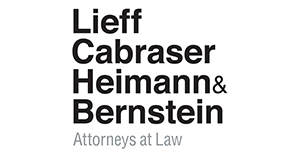 |
Partner
 |
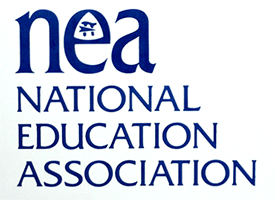 |
 |
|
Benefactor
 |
 |
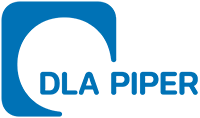 |
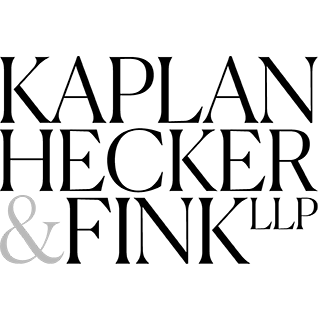 |
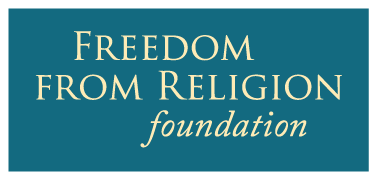 |
 |
 |
||
Patron
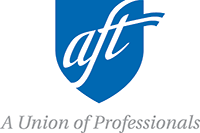 |
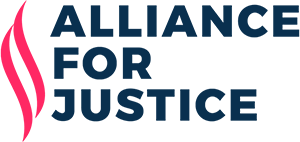 |
 |
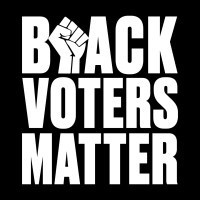 |
 |
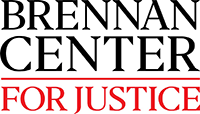 |
 |
 |
 |
 |
 |
 |
 |
 |
 |
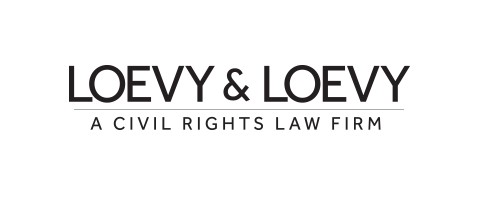 |
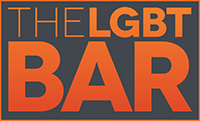 |
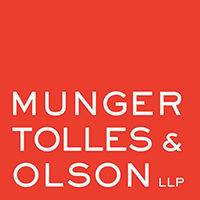 |
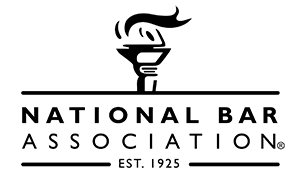 |
 |
 |
 |
 |
 |
 |
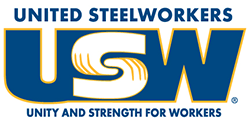 |
 |
 |
 |
If you have questions about sponsoring the 2024 ACS National Convention, please contact Zachary Holland, Assistant Director of Development, via email at: zholland@acslaw.org.

